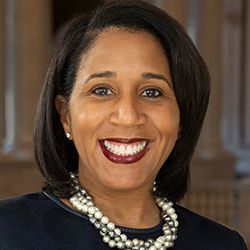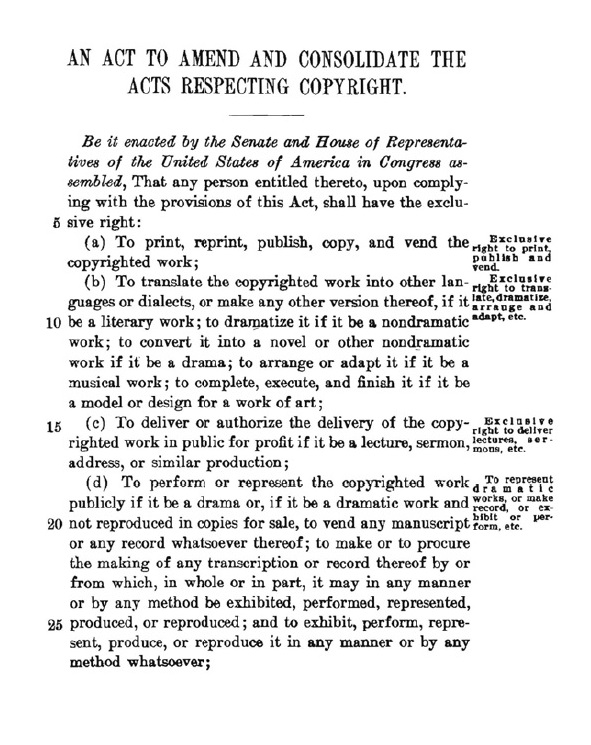2000–Present
Highlight: The Engine of Free Expression

In December 2014, the Copyright Office released the first comprehensive revision of the Compendium of U.S. Copyright Office Practices in more than two decades. The Compendium, Third Edition serves as the Copyright Office’s governing administrative manual for registrations and recordations. The revision presents more than 1,200 pages of practices and sets the stage for a number of long-term improvements.
On October 11, 2018, the Orrin G. Hatch–Bob Goodlatte Music Modernization Act, or Music Modernization Act or MMA, was signed into law, updating copyright protections in the music marketplace and granting the Copyright Office the authority to designate a Mechanical Licensing Collective and Digital Licensee Coordinator, the entities tasked with key aspects of the statute. It also provided certain protections and limitations to pre-1972 sound recordings and updated the law regarding producer royalties. It is the most significant copyright legislation in decades.
-
International Copyright
-
History of the Copyright Office
-
Copyright Law
-
Copyright in the Courts
-
Copyrighted Works and Distance Education
November 2, 2002
The Technology, Education, and Copyright Harmonization Act of 2002 provides for the use of copyrighted works by accredited nonprofit educational institutions in distance education.
-
Supreme Court Upholds Copyright Term Extension
January 15, 2003
In Eldred v. Ashcroft, the Supreme Court upholds the constitutionality of the Sonny Bono Copyright Term Extension Act.
-
Preregistration Introduced
April 27, 2005
The Artists' Rights and Theft Prevention Act allows for preregistration of certain works being prepared for commercial distribution.
-
Supreme Court Rules on File-Sharing Software
June 27, 2005
In Metro-Goldwyn-Mayer Studios, Inc. v. Grokster, Ltd. the Supreme Court rules that providers of software designed to enable file sharing of copyrighted works may be held liable for copyright infringement that takes place using that software.
-
Electronic Copyright Registration Begins
July 1, 2007
Electronic registration on the Copyright Office website is made available to the public.
-
Twelfth Register Is Appointed
June 1, 2011

Maria A. Pallante is appointed Register of Copyrights. Prior to her appointment, Pallante held senior positions in the Copyright Office, including as Acting Register, and at the Guggenheim Museum.
-
Supreme Court Rules That Congress May Restore Copyright in Certain Foreign Works
January 18, 2012
The Supreme Court upholds the Uruguay Round Agreements Act when it holds in Golan v. Holder that Congress may restore copyright in public domain works.
-
United States Becomes a Signatory to the Beijing Treaty on Audiovisual Performances
June 26, 2012
The United States becomes a signatory to the Beijing Treaty on Audiovisual Performances, which updates the international legal framework for audiovisual performers to provide rights and protections similar to those already provided for musical performers under the WIPO Performances and Phonograms Treaty. The Treaty now awaits ratification by the U.S. Senate.
-
Supreme Court Rules That First Sale Doctrine Applies to Lawfully Made Foreign Works
March 19, 2013
In Kirtsaeng v. John Wiley & Sons, Inc., the Supreme Court holds that the first sale doctrine applies to copyrighted works made lawfully in foreign countries.
-
United States Becomes a Signatory to the Marrakesh Treaty
October 2, 2013
The United States becomes a signatory to the Marrakesh Treaty to Facilitate Access to Published Works for Persons Who Are Blind, Visually Impaired, or Otherwise Print Disabled, which addresses both the domestic and cross border exchange of printed materials in accessible formats.
-
Supreme Court Rules That Latches Cannot Be Used as a Reason for Not Pursuing Damages for Copyright Infringement
May 19, 2014
In Petrella v. Metro-Goldwyn-Mayer, Inc., the Supreme Court rules that latches (i.e., certain unreasonable delays) cannot be invoked as a bar to pursuing damages in claims for copyright infringement within the three-year window allowed in section 507(b) of the Copyright Act.
-
Supreme Court Rules That Online Streaming Services May Be a Public Performance
June 25, 2014
The Supreme Court holds in American Broadcasting Companies, Inc. v. Aereo, Inc. that Aereo’s service of providing online streaming to paying customers was a transmission of a work to the public.
-
Statutory License for Satellite Rebroadcasting is Renewed
December 4, 2014
A new law extends until 2020 the statutory licensing for secondary transmissions of broadcast signals by satellite carriers.
-
Supreme Court Clarifies Attorney’s Fees Provisions under the Copyright Act
June 16, 2016
The Supreme Court holds in Kirtsaeng v. John Wiley & Sons, Inc. that, when deciding whether to grant attorney’s fees under the Copyright Act, a court should give substantial weight to the objective reasonableness of the losing party’s position, while still taking into account a range of other considerations.
-
Librarian of Congress Names Karyn A. Temple as Acting Register of Copyrights
Oct. 21, 2016

Librarian of Congress Carla Hayden names Karyn A. Temple as Acting Register of Copyrights. Temple previously served as Associate Register of Copyrights and Director of Policy and International Affairs for the U.S. Copyright Office.
-
Copyright Office Establishes the Copyright Modernization Office
Oct. 21, 2016
The Copyright Office establishes the Copyright Modernization Office, as required by the Modified U.S. Copyright Office Provisional IT Modernization Plan. The Copyright Modernization Office provides the business direction necessary to ensure that modernization projects are continuously aligned with the Office’s mission and strategic goals.
-
Supreme Court Rules on Standard for Protection of Separable Elements of Useful Articles
March 22, 2017
In Star Athletica, LLC v. Varsity Brands, Inc., the Supreme Court rules that “a feature incorporated into the design of a useful article is eligible for copyright protection only if the feature (1) can be perceived as a two- or three-dimensional work of art separate from the useful article and (2) would qualify as a protectable pictorial, graphic, or sculptural work—either on its own or fixed in some other tangible medium of expression—if it were imagined separately from the useful article into which it is incorporated.”
-
Congress Passes the Music Modernization Act
October 11, 2018
The Orrin G. Hatch–Bob Goodlatte Music Modernization Act, or MMA, is signed into law, updating copyright protections in the music marketplace and granting the Copyright Office the authority to designate a Mechanical Licensing Collective and Digital Licensee Coordinator, the entities tasked with key aspects of the statute. It also provides certain protections and limitations to pre-1972 sound recordings and updates the law regarding producer royalties.
-
United States Joins the Marrakesh Treaty
February 8, 2019
The United States officially joins the Marrakesh Treaty to Facilitate Access to Published Works for Persons Who Are Blind, Visually Impaired, or Otherwise Print Disabled (Marrakesh Treaty) by depositing its instrument of ratification with the World Intellectual Property Organization (WIPO). The Marrakesh Treaty requires its contracting member nations to make it easier for those with print disabilities to access printed works in accessible formats such as braille and digital audio files. It also establishes rules for the international exchange of accessible format copies.
-
Supreme Court Rules That Copyright Holders Must Register (or Receive a Refusal for) U.S. Works before Bringing a Lawsuit
March 4, 2019
In Fourth Estate Public Benefit Corp. v. Wall-Street.com, LLC, the Supreme Court rules that an infringement suit cannot be brought until the Copyright Office registers, or refuses an application to register, a copyright claim.
-
Karyn A. Temple Is Appointed Thirteenth Register of Copyrights
March 27, 2019

Librarian of Congress Carla Hayden appoints Karyn A. Temple as the thirteenth Register of Copyrights and Director of the U.S. Copyright Office. Prior to her appointment, Temple served in several roles within the Copyright Office, including as Acting Register of Copyrights from October 21, 2016, to March 26, 2019, and as Associate Register of Copyrights and Director of Policy and International Affairs for the United States Copyright Office from January 30, 2013, to October 21, 2016.
-
Copyright Office Designates Mechanical Licensing Collective and Digital Licensing Coordinator
July 8, 2019
The Copyright Office designates the Mechanical Licensing Collective, Inc. (MLC) and the Digital Licensee Coordinator, Inc. (DLC) pursuant to the Music Modernization Act. The MLC will administer the new blanket license and distribute collected royalties to songwriters and music publishers, as well as develop and maintain a comprehensive database of musical works and sound recordings, which will be publicly available. The DLC will represent digital music services in the administration of the license and in the determination of the administrative assessment fee paid by digital music providers for the reasonable costs of establishing and operating the new MLC.
-
Librarian of Congress Names Maria Strong as Acting Register of Copyrights
December 18, 2019

Librarian of Congress Carla Hayden names Maria Strong as Acting Register of Copyrights. Strong continues in her position as Associate Register of Copyrights and Director of Policy and International Affairs at the U.S. Copyright Office.
-
The Satellite Television Community Protection and Promotion Act of 2019 Is Signed into Law
December 20, 2019
On December 20, 2019, the Satellite Television Community Protection and Promotion Act is signed into law, providing a non-expiring compulsory license for satellite retransmissions of distant network stations and non-network “superstations.” The law also overhauls section 119 of the Copyright Act to narrow the definition of “unserved households” that can receive signals under the license.
-
Copyright Office Continues Services during Pandemic and Offers Relief for Affected Applicants and Copyright Owners
March 17, 2020
The U.S. Copyright Office maintains its services for online registration, searching copyright-related records, and learning about copyright topics while on-site staffing is curtailed in response to the COVID-19 pandemic. The Office implements extended telework requirements. Over the next few months, the Office makes several adjustments in its services and requirements to adjust timing provisions, allow for expanded use of electronic submissions, and other accommodations to provide relief for those affected by pandemic conditions.
-
CARES Act Authorizes Temporary Adjustment of Timing Provisions of Copyright Act
March 31, 2020
A new law authorizes the Register of Copyrights to allow additional time for copyright owners to register works to be eligible for certain remedies in infringement actions.
-
Copyright Office Celebrates Its 150th Anniversary with Virtual Event
August 5, 2020
The Copyright Office hosts an online event to celebrate the 150th anniversary of the centralization of the administration of copyright law in the Library of Congress.
-
Shira Perlmutter Is Appointed Fourteenth Register of Copyrights
September 21, 2020

Librarian of Congress Carla Hayden appoints Shira Perlmutter as the fourteenth Register of Copyrights and Director of the U.S. Copyright Office, to begin her tenure on October 26, 2020. Prior to her appointment, Perlmutter served as Chief Policy Officer and Director for International Affairs at the U.S. Patent and Trademark Office from 2012 to 2020. From 1995 to 1999, Perlmutter served as the Associate Register for Policy and International Affairs at the U.S. Copyright Office.
-
Congress Passes CASE Act of 2020 and Law Regarding Unauthorized Streaming Services
December 22, 2020
Congress enacts the Copyright Alternative in Small-Claims Enforcement Act of 2020 and a law on penalties for certain digital transmission services that make unauthorized uses of copyright-protected works for profit, both as part of the Consolidated Appropriations Act of 2021. The CASE Act establishes a voluntary, streamlined adjudication process in the Copyright Office to consider copyright matters for claims that do not exceed $30,000.
